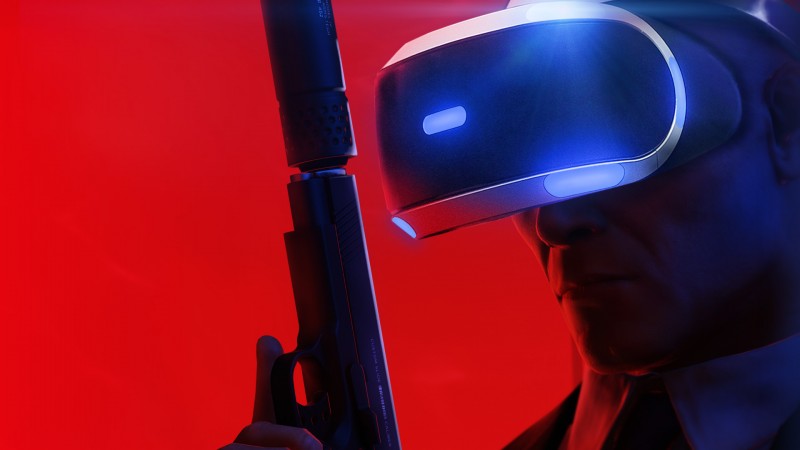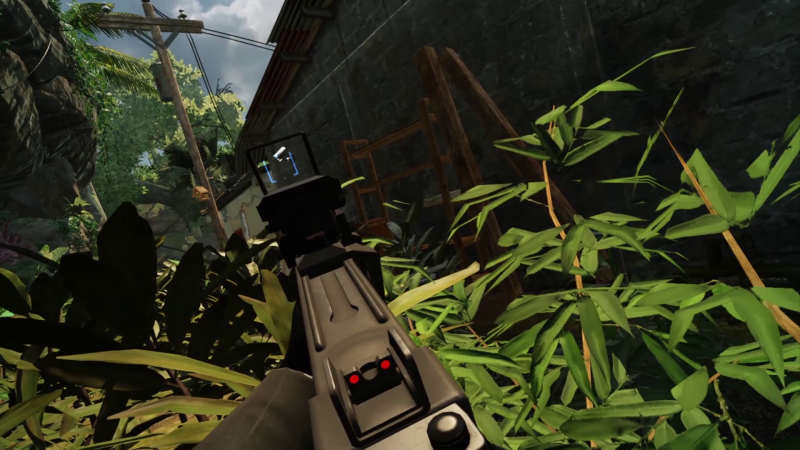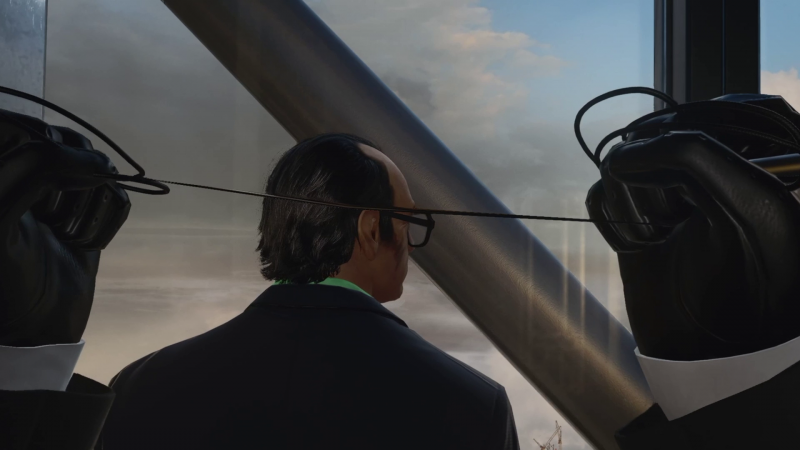
When it comes to Hitman VR, IO Interactive owes a lot to the game Firewall: Zero Hour, the PlayStation VR game from First Contact Entertainment.
As Eksil Møhl, a senior game designer at IO, tells it, the studio’s interest in VR started two years ago with his coworker Oliver Winding, a senior writer at the company. One day, Winding approached Møhl, asking him to come over. He wanted Møhl to try out his new PlayStation VR. Møhl was taken with the system, going out and buying his own as a Christmas present to himself. And that’s when he played Firewall. Like Winding, Møhl wanted to show off the PlayStation VR headset. He took it to the IO office, showing his coworkers, and having them play Firewall. As luck would have it, people at IO Interactive shared his enthusiasm, including lead game designer Sidsel Hermansen, who recalls that people at the office “couldn’t stop playing.”
“We just had to play, play, play,” Hermansen says.
This past August, IO announced it was bringing the World of Assassination trilogy to the PlayStation VR, updating the first two games, Hitman 1 and 2, to support the technology, as well as developing the upcoming Hitman 3 with VR in mind. According to Møhl and Hermansen, it was the excitement the studio had over games like Firewall that led the team to making its own VR mode for Hitman.
Within IO, the Hitman VR team is small – only 10 or 12 people plus QA. It’s a low headcount, especially considering three games worth of content is being updated to support an entirely new way of play, but IO isn’t building a new game from the ground up; it’s updating existing software. One of the surprising things the team found when beginning its work on Hitman VR was, even though none of the previous games were made with VR in mind, the levels that were built naturally lent themselves to the new perspective.
“It’s environment art, it’s the character art, it’s sound design – sound design, I get goosebumps just thinking about it, the sound design is so f—ing beautiful,” Hermansen says. “The A.I., even the systemics as well, it just works.”
“And we found s— like one of the levels 47 has to pick up this USB stick. It’s an intel item, something you pick up and you just go, ‘Bloop!’ The prompt is like this big,” Mohl adds, gesturing the size of a thumb drive. “So in VR you can go in and actually look at it like this,” he puts his face close to the table he’s sitting at, “and some weird guy or girl has made the most insane USB stick. Like, the little light on it and a little wrapper around it that’s sort of dirty. It almost had fingerprints on it.”

Another thing Møhl brings up are the guns in Hitman. When they started working with VR, they assumed they’d need to go in and add holo-dot sights for aiming in first person. Despite the fact Hitman games are in third-person, whichever artist modeled those guns had already done that for them.
The Hitman games are already, to some extent, about roleplay; players can choose how they want to assassinate their targets, down to what outfits Agent 47 wears and what items he uses. Bringing these games into VR amplifies this. It brings out people’s personalities, Hermansen says. Some people will play super cautiously. Others will take every opportunity to mess with the world and bother NPCs.
“[If] you’ve played Miami [in Hitman 2], there’s an underpass with a guy playing the drums,” Hermansen says. “And he’s like a street musician. And there was this one day where I was like, ‘I’m going to play around a bit,’ and I realized I could f— him up. I could pull his hands away … I would take his hand up and then,” she begins mimicking the motion of a hand falling down on a drum. “There are so many awesome surprises, where it’s like, ‘Oh, this is just in there. What the f— is going on?’”
One thing that is very different in Hitman VR is the way it reduces your distance from the game’s violence. By design, virtual reality eliminates a lot of separation a player has from what’s happening on screen, effectively tricking your brain into thinking you’re really in this location doing these things. The Hitman games can be brutal; there are ways to kill people that are extremely violent. It’s something the team says it thought about during the making of Hitman VR, and while it has changed some kill animations in the game to better fit VR, it hasn’t changed any of the game’s content. That said, players may take it upon themselves to make their experience less bloody, if Hermansen and Møhl’s experiences are anything to go off of.

“We have a ton of different faces and stuff, but when you’re in VR you notice, ‘Oh, it’s that guy!’” Møhl says. “He’s also being used over here. And he’s also the butcher in [Hitman 2 level] Sapienza. I remember I had to do something brutal to somebody, and Kurt was there and I was like, ‘All right, I’m going to kill him.’ But he was like, ‘Hey!’”
“‘Hey, how’s your day?’” Hermansen replies.
“Yeah! Then I was like, ‘There’s no way I can kill him now,” Møhl adds.
“In that way, it actually feels more personal, the stuff you do,” Hermansen says. “If you f— up, if you have to murder some innocent civilian, then for me, personally, I feel pretty bad. I’m not going to do that again. Like, next time I’m going to do better, because it’s on me to be a good assassin. Because it’s so much more personal and intense, and it feels like I’m the one stabbing some poor woman with a knife.”
Talking to the Hitman VR team, there’s an infectious excitement behind everything they say. In the course of just an hour, I went from being not particularly interested in Hitman VR to Googling how much it’d cost to buy a PlayStation VR setup. Considering Hitman 3 is the first game IO is releasing since it became an independent studio, it’s easy to get the impression this is a passion project for the small team; a labor of love made within a larger company.
“It’s always fun to make games – oh my god, not always, that’s bulls—; it’s also sucky sometimes – but I think because us as game designers and them as gameplay coders, we like to do new s—,” Hermansen says. “Everyone gets super excited. The coders also got super excited, like, ‘We could do this!’ and ‘Actually, we usually wouldn’t go there, but aw, f— we have to do it,’ right? So that excitement has really driven us and we’ve done much more than should be possible on a relatively small team because of the excitement. I don’t know if that was surprising, but it’s been a beautiful thing.”